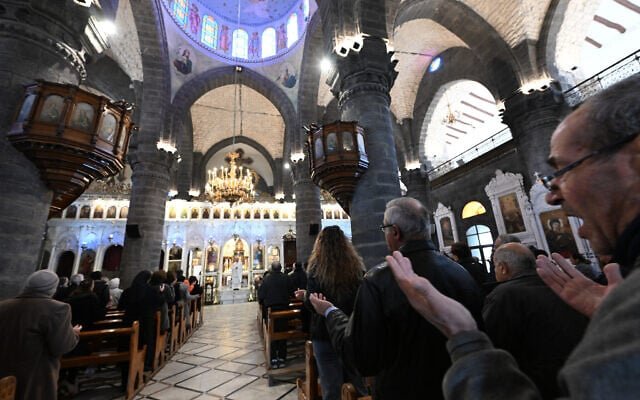A week after a lightning offensive toppled longtime leader Bashar al-Assad, Syrians are only beginning to scratch the surface of the atrocities committed under his rule, as the country’s new rulers seek to reassure the international community.
UN special envoy for Syria Geir Pedersen arrived in Damascus on Sunday, his spokesperson said, declining to give details of his agenda.
Calm is slowly returning to the streets of the capital, with dozens of children streaming back to school on Sunday for the first time since Assad fled.
“The school has asked us to send middle and upper pupils back to class,” said mother of three Raghida Ghosn, 56.
“The younger ones will go back in two days,” she told AFP.
An official at one Damascus school said “no more than 30 percent” were back on Sunday, but that “these numbers will rise gradually.”
Assad fled Syria last weekend following an 11-day rebel offensive led by the Islamist rebel group Hayat Tahrir al-Sham (HTS), bringing to a dramatic end more than 50 years of brutal Assad clan rule.
His fall comes over 13 years into the civil war sparked by Assad’s violent crackdown on pro-democracy protests in 2011.
The war has killed upwards of 500,000 people and displaced more than half the country’s population.
In the week since the rebels took Damascus, each day has seen more light shed on the depths of the despair visited upon Syria’s people over the past five decades.
Journalist Mohammed Darwish was one of those held in the so-called Palestine Branch, or Branch 235, a jail that was run by Syria’s feared intelligence services.
“I was one of those they interrogated the most,” Darwish told AFP as he returned to the prison years after his ordeal in 2018. He said he was questioned “every day, morning and night” for 120 days.
On Saturday, US State Secretary Antony Blinken said Washington had “been in contact with HTS and with other parties,” without specifying how this contact occurred.
Meanwhile, Western and Arab states along with Turkey — a key backer of anti-Assad rebels — called for a united peaceful Syria following a meeting between Blinken and top diplomats in Jordan.
In a joint statement, diplomats from the United States, Turkey, the European Union, and Arab countries called for a Syrian-led transition to “produce an inclusive, non-sectarian and representative government formed through a transparent process,” with respect for human rights.
A Qatari delegation was due in Syria Sunday to meet transitional government officials for talks on aid and reopening its embassy.
Unlike other Arab states, Qatar never restored diplomatic ties with Assad after a rupture in 2011.
Sunni Muslim HTS is rooted in Syria’s branch of al-Qaeda and is designated a terrorist organization by many Western governments.
Although it has sought to moderate its rhetoric in recent years, its seizure of power has sparked concerns both domestically and internationally over the protection of religious and ethnic minorities.
The interim government insists that the rights of all Syrians will be protected, as will the rule of law.
On Sunday, Syrian Christians attended their first church service since Assad’s fall.
Pubs and stores selling alcohol in Damascus initially closed following the rebel victory, but are now tentatively reopening.
Safi, landlord of the Papa bar in the Old City, said the rebels told him: “You have the right to work and live your life as you did before.”
Assad was propped up by Russia — where he fled — as well as Iran and Lebanon’s Hezbollah terror group.
The rebels began their offensive on November 27, the same day a ceasefire took effect in the Israel-Hezbollah war in Lebanon, which was initiated by the terror group in October 2023 and in which Assad’s ally suffered staggering losses.
Naim Qassem, the leader of the Iran-backed Hezbollah, admitted Saturday that with Assad’s fall, his group could no longer be supplied militarily through Syria.
He also said he hoped Syria’s new rulers saw Israel “as an enemy” and would not normalize ties with the country.
Both Israel and Turkey have carried out military strikes inside Syria since Assad’s fall.
Last week Israel launched a major operation to destroy the Syrian military’s strategic military capabilities, including chemical weapons sites, missiles, air defenses, air force and navy targets, in a bid to prevent them from falling into the hands of hostile elements.
The Syrian Observatory for Human Rights on Sunday reported fresh Israeli strikes near Damascus, after 60 strikes across Syria on Saturday.
The Britain-based Observatory, which relies on a network of sources in Syria and is of uncertain accuracy, reported strikes on Syrian army tunnels and arms depots in the Damir area near Damascus on Sunday.
Israel has also ordered troops into a UN-patrolled buffer zone separating Israeli and Syrian forces on the Golan Heights, a move the UN said violated a 1974 armistice. Israel has said it will not become involved in the conflict in Syria and that its seizure of the buffer zone established was a defensive move and a temporary one until it can guarantee security along the frontier.
HTS leader Abu Mohammed al-Julani, now using his real name Ahmed al-Sharaa, said the Israeli move “threatens a new unjustified escalation in the region.”
But “the general exhaustion in Syria after years of war and conflict does not allow us to enter new conflicts,” he said in an online statement.
